Autonomous driving in a "simple environment" is fairly easy but becomes hard to keep safe when other factors are in play, according to the CEO of self-driving start-up Pony.ai.
Echoing some of the comments he made earlier in the week, James Peng highlighted the challenges faced.
"The reason autonomous driving is so hard is because all of us, right, we are sharing the same road with AI (artificial intelligence) and we are irrational at a lot of times," Peng, who was speaking on a panel discussion on Tuesday at the East Tech West conference in China, explained.
"So, this is the task: where autonomous driving in a simple environment is fairly easy, it can be easily done, but if you're adding the irrationality of all the other vehicles, pedestrians, then it becomes very hard to keep it safe," he added.
Around the world, the last few years have seen a range of tests and developments take place in the autonomous vehicle sector.
At the end of October, for example, the Volkswagen Group announced the creation of a subsidiary called Volkswagen Autonomy (VWAT), with the German car giant saying it planned to "make autonomous driving market-ready."
With offices in Munich and Wolfsburg, Volkswagen said that VWAT would aim to "bring a self-driving system… to market maturity." As well as its sites in Germany, Volkswagen said it also planned to establish companies in Silicon Valley and China in 2020 and 2021 respectively.
For its part, Pony.ai, which has offices in the U.S. and China, and Hyundai recently launched BotRide. Pony.ai has described BotRide as "a shared, on-demand, autonomous vehicle service operating on public roads in California."
On the mass adoption of autonomous vehicles, Pony.ai's Peng sought to add some perspective to the discussion, emphasizing that tests were already underway.
"I think people tend to be super optimistic at the beginning and suddenly become very pessimistic, but I think that shouldn't be the case either," he argued, explaining that his firm had almost 30 vehicles that were being tested in the Nansha area of Guangzhou, even during rush hour.
"You will see the vehicles actually being able to handle complex driving situations, very, very complex driving scenarios."




